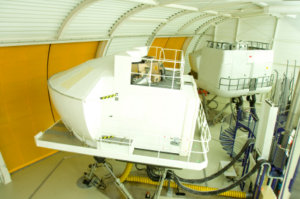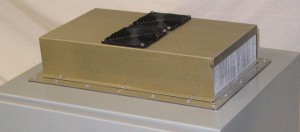December 3rd, 2010Success Stories Product Information
 Market
MarketMilitary, Aerospace
Flight simulator for military helicopter pilot training
A helicopter flight simulator for military applications was being utilized in the Middle East for pilot training. Trainees found that the small cockpit on the simulator was getting too hot for them to adequately operate the simulator after only just a few short minutes in the cockpit. Cooling the cockpit proved to be a unique situation because of the simulator’s vibration and constant motion. After researching solutions, the customer found a standard compressor based A/C would not work for this application due to the extreme movements which would continually change the orientation of the unit. A solution was needed that would be adaptable enough to move along with the simulator.
EIC’s Model 145 – 1500 BTU 120VAC thermoelectric air conditioner

EIC provided a custom thermoelectric cooling system meeting the specific needs of the helicopter flight simulator. The company installed an EIC thermoelectric air conditioner directly above the operator to provide direct flow of cooled air into the cockpit. EIC offered design assistance, and the thermoelectric air conditioner was versatile enough to be through-mounted horizontally on the ceiling of the cockpit, meaning almost no alteration was needed to the cockpit structure, and the air conditioner did not take up a lot of the essential space in the cockpit.
The installation of the cooling system to the flight simulator allowed for greater functionality and success of the military training program. Before the thermoelectric air conditioner was installed, pilots were overheating during the first few minutes of the simulation. With the cooling equipment in place, trainees can now concentrate on the simulation program. Additionally, the choice of using of a solid state air conditioner over a compressor based cooling system provided for easy installation with minimal changes to the cockpit, worry-free operation, and the ability of the cooling system to withstand the motion of the simulator.